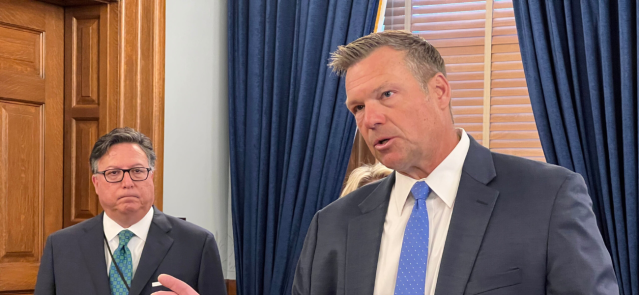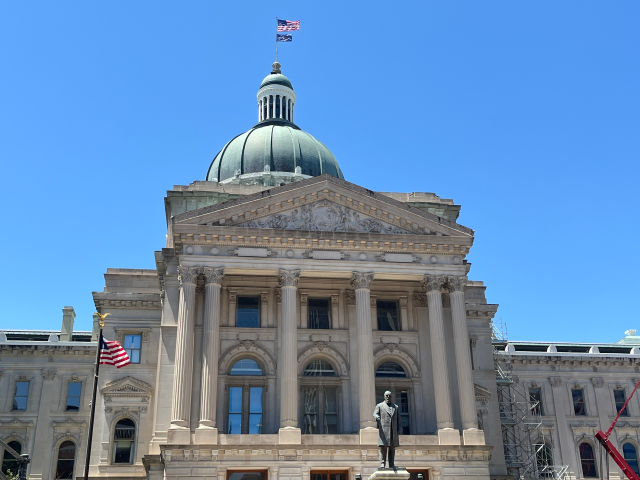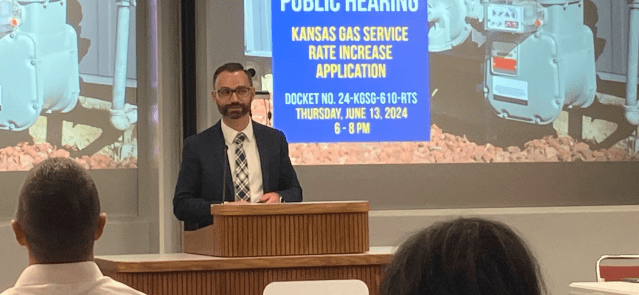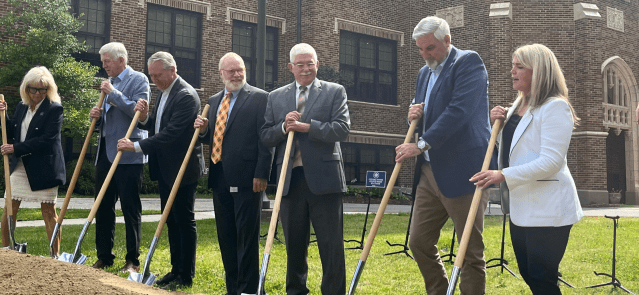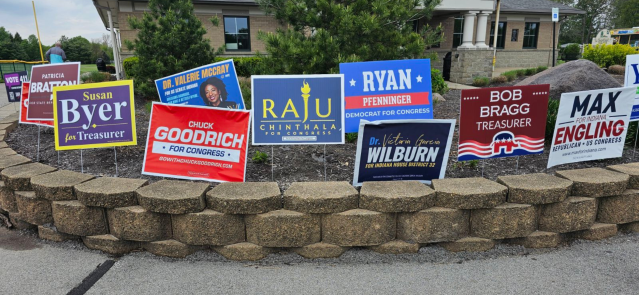Stay ahead of the curve as a political insider with deep policy analysis, daily briefings and policy-shaping tools.
Request a DemoSR 89A closures scheduled in Oak Creek Canyon starting Aug. 15
Governor Ducey: Citizens For Free Enterprise Will Be A “Game Changer”
Gallego Calls Out Administration for Insufficient Extreme Heat Response
Kansas, 14 other states sue to block DACA recipients from Obamacare
Kansas and 14 other states are suing to stop a Biden administration rule that would expand certain health care access to Deferred Action for Childhood Arrivals recipients.
Attorney General Kris Kobach filed a lawsuit Thursday in North Dakota to challenge a rule, set to go into effect Nov. 1, that’s expected to make more than 200,000 DACA recipients eligible for plans under the Affordable Care Act. That number would include 4,350 in Kansas.
The recipients — known as Dreamers — are immigrants who entered the country unlawfully as children. Under the program, Dreamers have any deportation action deferred and are eligible for a work permit.
The lawsuit seeks to prevent an additional benefit for DACA recipients.
“Illegal aliens shouldn’t get a free pass into our country,” Kobach said in a news release. “They shouldn’t receive taxpayer benefits when they arrive, and the Biden-Harris administration shouldn’t get a free pass to violate federal law. That’s why I am leading a multistate lawsuit to stop this illegal regulation from going into effect.”
Kobach said on X that the new rule would “worsen the disaster at the border.”
“It is likely that aliens who would otherwise have returned to their countries of origin will instead remain in the United States because of the eligibility for ACA coverage provided by the Final Rule,” the complaint said.
The White House announced the rule in May, with President Joe Biden saying in a statement that Dreamers “deserve the promise of health care just like all of us.”
“That’s why I’ve previously directed the Department of Homeland Security to take all appropriate actions to ‘preserve and fortify’ DACA,” Biden said. “And that’s why today we are taking this historic step to ensure that DACA recipients have the same access to health care through the Affordable Care Act as their neighbors.”
Kobach is joined in the lawsuit by attorneys general from Alabama, Idaho, Indiana, Iowa, Missouri, Montana, Nebraska, New Hampshire, North Dakota, Ohio, South Carolina, South Dakota, Tennessee and Virginia.
Bryan Richardson is the managing editor at State Affairs Pro Kansas/Hawver’s Capitol Report. Reach him at [email protected] or on X @RichInNews.
State files to dismiss legal challenge to new college ‘intellectual diversity’ law
On behalf of the state, Attorney General Todd Rokita’s office has filed to dismiss a suit claiming a new law violates the First Amendment by requiring public college faculties to promote “intellectual diversity.”
In a memorandum supporting the motion, Rokita argued the four plaintiffs — educators at Indiana public universities — lack standing to bring the lawsuit, in part because they filed it too early.
In May, two tenured faculty members at Purdue University Fort Wayne — Professor Steven Carr and Associate Professor David Schuster — filed the suit against the university’s trustees. Represented by the American Civil Liberties Union of Indiana, they challenged the Republican-backed Senate Enrolled Act 202, which went into effect July 1.
The law requires faculties at Indiana’s public college and universities to promote “free inquiry,” “free expression” and intellectual diversity. To ensure compliance, the law established an employee and student complaint process, disciplinary actions, reporting requirements and tenure reviews at least every five years.
Since the initial filing, two Indiana University faculty members — Professor James Scheurich and Associate Professor David McDonald — have joined the lawsuit as plaintiffs, and Rokita’s office, representing the state, has filed as an intervenor. The trustees of Indiana University have been added as a defendant.
The universities have similarly filed a motion to dismiss. In addition, they joined the state in opposing the plaintiffs’ motion for preliminary injunction. The U.S. District Court of the Southern District of Indiana, with which the case was filed, has yet to rule on the latter.
Rokita’s office says the plaintiffs only fear potential misapplications of the law and are basing their arguments on “speculative injuries.” Additionally, boards of trustees are bound with legal obligations under the law, the office claims, not the plaintiffs, whose quarrel is with “unknown third parties who may one day enforce final policies contemplated by the Act.”
“The manufactured fears put forth in yet another illegit lawsuit by the ACLU don’t lack imagination, but the professors do lack standing to even bring this action,” Rokita said in an email to State Affairs. “Our office will continue to defend in court this new law, which enables students to engage in free inquiry and ensures state universities foster diversity of thought.”
The ACLU of Indiana filed a reply to the motions, saying the law chills professors’ speech and “imposes affirmative obligations on the professors that must be included in whatever policies the Boards adopt.” The reply memorandum says only professors, not the boards, could face penalties for falling short of the law’s instructional requirements.
As for whether the plaintiffs have suffered an injury: The ACLU of Indiana contends they have by feeling compelled to adjust their teaching plans for the upcoming academic year, by “forgoing speech or classroom activities they would otherwise have included and adding content they otherwise would not have.”
The ACLU of Indiana declined a State Affairs request for comment, explaining it isn’t participating in interviews while the lawsuit plays out.
Sen. Spencer Deery, R-West Lafayette, said during the 2024 legislative session that his bill would protect students, higher education employees and faculty from public higher education administrators who have turned their campuses into “monolithic echo chambers.”
A final pretrial conference for the case is scheduled for Jan. 13, 2026, and a bench trial is scheduled for Jan. 26, 2026.
Contact Jarred Meeks on X @jarredsmeeks or email him at [email protected].
Statehouse Briefs: Kansas Gas Service agrees to smaller rate increase
Kansas Gas Service has agreed to a smaller rate increase, which still needs the final go-ahead from the Kansas Corporation Commission.
The commission on Thursday said it will meet next week — 10:30 a.m. Tuesday at its Topeka office — to consider the proposal.
Residential customers with average usage would see an increase in their monthly bill of approximately $3.83 per month or $42.02 per year, according to the agreement.
The agreement eliminates a proposal for two rate structures based on high or low usage. The monthly increase would’ve been $6.71 for residential customers with lower usage or $9.48 for customers using more.
Kansas Gas Service would have nearly a $35 million increase in net revenue under the agreement. That’s a decline of about 40% from the company’s original ask of $58.1 million.
Kansas Gas Service, commission staff, the Citizens’ Utility Ratepayer Board and WoodRiver Energy filed a unanimous settlement agreement last week with the commission.
In July, the commission and the citizens board called for smaller rate increases.
Commission staff members called for $31.7 million in additional revenue, and the citizens board, which advocates for residential and small commercial customers, wanted an even lower bump: $10.8 million.
Both groups opposed the two-tier rate proposal.
The original proposal drew the ire of customers at a June informational meeting in Topeka, with some complaints about how the increase would affect seniors on fixed incomes.
The commission may approve, reject or modify the agreement. A commission order is due on or before Oct. 25.
Flag order for Wichita Firefighter Ty Voth
Flags throughout Kansas will be flown at half-staff from sunup to sundown Friday, the funeral day for Wichita Firefighter Ty Voth.
Voth, 27, died Aug. 1 after sustaining injuries while fighting a house fire.
Gov. Laura Kelly issued the executive order earlier this week.
“Ty Voth made the ultimate sacrifice, and he was taken much too soon,” Kelly said in a statement. “His dedication and selflessness will not be forgotten. My deepest condolences go out to his family, loved ones, colleagues, and the entire Wichita community.”
Bryan Richardson is the managing editor at State Affairs Pro Kansas/Hawver’s Capitol Report. Reach him at [email protected] or on X @RichInNews.
Construction starts soon on combined campus for Indiana’s blind and deaf schools
Work is about to start on an estimated $655 million project to create a combined campus for Indiana’s School for the Blind and Visually Impaired and School for the Deaf, the latest in the state’s multibillion-dollar construction spree.
Gov. Eric Holcomb joined leaders of the two schools at a groundbreaking ceremony for the project overhauling the current blind school campus on the northside of Indianapolis.
Details on co-location project
The blind school campus dates to 1930, and project plans include renovating its administration building and auditorium, along with constructing new academic buildings, a residence hall, and gymnasium and pool space. The existing natatorium will be converted into a dining hall the schools will share.
The blind school’s roughly 100 residential students from around the state will live at deaf school campus housing near the Indiana State Fairgrounds while construction work is going on, school Superintendent James Durst told State Affairs.
Those students will attend classes at two vacant schools owned by Indianapolis Public Schools until the new campus opens, which is scheduled for fall 2028.
Plans for the shared campus faced questions from some who are concerned about combining student populations with different needs.
Durst, however, said the two schools have long had a close working relationship.
“I think we have a lot more in common than our differences,” Durst said. “I think the opportunity to keep our traditions and to keep our own identities, but be able to share resources for the good of both schools and for the good of the students we serve, while also being very conscious of state resources and being good stewards, is going to help both schools and help our students improve well into the future.”
Legislators included $253 million for the project in the two-year state budget approved in 2023. That was the third installment of money budgeted toward the campus overhaul.
Future of deaf school site
Officials have not decided on the future use of the 80-acre Indiana School for the Deaf property after the new campus is completed.
Indiana State Fair Commission leaders have expressed interest in the property that is just north of the fairgrounds but surrounded otherwise by residential neighborhoods. Much of the property is used for parking during the State Fair.
The deaf school has been at the site since 1911 and now has about 275 students.
Holcomb indicated a decision on the property’s future might not be made until after he leaves office in January.
“Nothing is off the table as of right now, but we’ll make sure that it makes sense in terms of the neighborhood, that specific, unique neighborhood,” Holcomb told reporters.
Part of state’s building spree
The blind and deaf schools are part of several major state construction projects now underway.
Legislators directed $1.25 billion toward such projects in last year’s state budget, partly using federal COVID-19 pandemic relief funding. Additional money was appropriated in earlier budgets.
That big-ticket work includes the $1.2 billion Westville prison project, the new $97 million State Archives Building and a $95 million expansion and modernization of the Indiana Law Enforcement Academy in Plainfield. Other projects include a $100 million hotel and conference center at Potato Creek State Park near South Bend and $255 million in upgrades to Indiana’s interstate highway rest areas.
Holcomb called those projects important modernizations for the state.
“We’ve been dusting off a lot of blueprints that were for, maybe, years and years and years gathering dust,” Holcomb said. “They were conversations that we have had going back to the ’80s and ’90s.”
Tom Davies is a Statehouse reporter for State Affairs Pro Indiana. Reach him at [email protected] or on X @TomDaviesIND.
4 tickets atop the Indiana ballot are set
With Vice President Kamala Harris officially securing the Democratic presidential nomination on Monday and selecting Minnesota Gov. Tim Walz as her running mate the next day, the tickets atop the Indiana ballot have been forged.
Harris and Walz will take on Republicans Donald J. Trump and Ohio U.S. Sen. JD Vance in the presidential race. Independent Robert F. Kennedy Jr. will also be on the Indiana ballot.
The Indiana gubernatorial tickets have Republican U.S. Sen. Mike Braun and running mate Micah Beckwith taking on Democrat Jennifer McCormick and running mate Terry Goodin, and Libertarian nominee Donald Rainwater and running mate Tonya Hudson.
Here is our analysis of the four tickets:
Trump-Vance, Republican presidential
From July 7 through July 21, Trump had a RealClearPolitics composite polling lead of 47.9%-44.8% over President Joe Biden. Biden led in only one poll in July after his disastrous June 27 debate with Trump. The president dropped out of the race on July 21 and immediately endorsed Vice President Harris. Up to that point, the Trump campaign was designed to take on the 81-year-old Biden. Now, Trump has become the oldest presidential nominee in American history.
The RealClearPolitics polling composite from July 22 through Aug. 4 reads like the proverbial “Tale of Two Cities.” Since July 22, Harris has led in seven of 11 national surveys and forged a composite 47.4%-46.9% lead.
When it comes to battleground states, Trump still has a 4% lead in Nevada, 2.8% lead in Arizona, 0.2% in Wisconsin, 1.8% in Pennsylvania, 3% in North Carolina and 0.8% lead in Georgia (where at his Saturday rally in Atlanta he bashed the state’s popular Republican governor, Brian Kemp). Harris has a 2% lead in Michigan. All of those Trump margins are in atrophy.
When it comes to traditional politics, the Trump-Vance ticket didn’t get a post-Republican National Convention bump. There was no positive polling increase when Vance was selected. In fact, CNN election analyst Harry Enten explained that since 2000, the veep nominee’s net favorable ratings have been +19%, while Vance is at -6%.
“I have gone back all the way to 1980 and he is the first guy immediately after the convention who actually had a net negative. Vance is under water,” Enten told CNN. “JD Vance is making history in completely the wrong way. Usually VP picks are popular. In this case he’s dragging Trump down.”
For historical context, Alaska Gov. Sarah Palin and Indiana U.S. Sen. Dan Quayle, two of the most heavily criticized running mate selections in history, held double-digit positive approval scores in 2008 and 1988, according to Enten.
The Trump campaign hasn’t figured out how to deal with Harris or Walz. Last week at the National Association of Black Journalists convention, Trump attempted to redefine Harris’ ethnicity from Black to Indian. He is now opting out of the Sept. 10 ABC debate despite having made the “anytime, anyplace, anywhere” challenge.
On Tuesday, Trump suggested Biden would make a comeback at the Democratic National Convention in Chicago later this month.
“What are the chances that Crooked Joe Biden, the WORST President in the history of the U.S., whose Presidency was Unconstitutionally STOLEN from him by Kamabla, Barrack HUSSEIN Obama, Crazy Nancy Pelosi, Shifty Adam Schiff, Cryin’ Chuck Schumer, and others on the Lunatic Left, CRASHES the Democrat National Convention and tries to take back the Nomination, beginning with challenging me to another DEBATE,” Trump wrote on his social media platform, Truth Social. “He feels that he made a historically tragic mistake by handing over the U.S. Presidency, a COUP, to the people in the World he most hates, and he wants it back, NOW!!!”
What’s more unhinged, Trump bashing the Republican governor of a crucial battleground state, or the Biden return scenario?
And Trump is trying to put distance between his campaign and the Heritage Foundation’s vastly unpopular Project 2025, the so-called Republican governing blueprint. The problem there is that Vance wrote the foreword for the accompanying book.
Harris-Walz, Democratic presidential
Republican pollster Frank Luntz declared on Wednesday that the new Democratic ticket “is now the front-runner and has the momentum.”
Luntz added in a post on X: “Walz is a good speaker, very presentable, knows the issues and mirrors her [Harris’] point of view. Kamala has the wind at her back and will get another bounce after the DNC. Voters who simply weren’t going to vote at all (for Biden because of his age) are now energized to vote for Harris.”
The crucial momentum phase now comes into focus between now and Sept. 10. The Trump campaign will seek to define Harris and Walz. If she can deflect the attacks, including the current TV ad on her portfolio role in the southern border situation, she could be in an advantageous position to withstand the inevitable “October surprise.”
Gov. Walz is credited with dubbing Trump and Vance “weird,” adding that the former “never laughs, unless he’s making fun of someone.”
FiveThirtyEight analyst Nathaniel Rakich called Walz “the safe choice” for Harris, adding, “Walz seems to offer something for everyone in the Democratic coalition and little to alienate key segments of the party’s base. That’s not to say Walz doesn’t have potential weaknesses. Republicans have already begun to criticize him for his handling of the 2020 protests over George Floyd’s murder in Minnesota, when he did not deploy the National Guard until the day after local leaders asked him to. And there’s a danger that such criticisms could stick.”
Sam Stein and Andrew Egger, writing for The Bulwark on Wednesday, added, “In an era where vibes rule everything around us, Walz by the end was the guy riding the zeitgeist. Walz was most assuredly not a front-runner when this process started. He wasn’t even among the top three midwestern governors in the mix. But his quick ability to brand the Republican ticket as ‘weird’ earned him immediate plaudits among the Democratic faithful. His economic populist pitch, his non-coastal elite résumé, and his mockery of JD Vance kept adding to the momentum.”
Tuesday’s opening Harris-Walz rally was one of joy for Democrats. On July 20, they were looking at a developing worst-case scenario with Biden as the nominee. Two days later, the clouds parted and the fog lifted, and their new ticket could become the best-case scenario.
Braun-Beckwith, Republican gubernatorial
Braun’s property tax proposal has been revised since it was released in late July. It was his first major policy rollout since winning the nomination in May.
“As Governor, I will introduce a bold agenda to deliver historic property tax relief for all Indiana residents,” Braun said in a statement. “My plan focuses on capping property tax increases, updating deductions, increasing transparency, and reforming the referendum process. My commitment to this agenda stems from my dedication to protecting the financial stability and well-being of Hoosier families.”
Republican House Speaker Todd Huston told State Affairs that Braun’s revised plan was a “great proposal to start from” but that he had not yet closely studied its impact.
The proposal for rolling back the past few years’ worth of homestead property tax increases begs questions about its consequences for other taxpayers and local governments. Echoing the concerns of some public schools advocates, officials from groups representing Indiana businesses, farmers and local governments at the Statehouse say they understand the aim of stemming the double-digit increases in homeowners’ property taxes but worry about tax burden shifts and possible big hits to county and city budgets.
Braun said his plan was focused on giving tax relief to homeowners and was “based on the principle that government can never grow faster than the underlying economy and the taxpayers’ ability to pay.”
“Everybody wants an assessed value break or decrease,” Association of Indiana Counties Executive Director David Bottorff told State Affairs. “Every class or property wants that, and every time that a single class or property gets that, it just shifts that burden.”
Katrina Hall, senior director of policy strategy and advocacy for Indiana Farm Bureau, said that farmers have also been hit hard by property tax increases and that Braun’s proposal could make the situation worse.
“Our policy really doesn’t support expanding the homestead deduction, just because what it does is reduce the tax base, and so in doing that, there are shifts to farmland,” Hall said.
And David Ober, senior vice president for the Indiana Chamber of Commerce, added, “Anytime that you deal with the assessed value of a home, it’s going to reduce the net assessed value of a taxing unit, and that’s going to increase tax rates, which will be felt by other property owners. That means commercial and agricultural properties are going to see higher tax rates.”
Matthew Greller, CEO of Accelerate Indiana Municipalities, said any changes to the property tax system must include the recognition that between 45% and 65% of the general fund budgets for cities and towns comes from those taxes.
“Of their general fund budgets, 70% usually, at least, goes to public safety,” Greller said. “So anytime you start talking about property taxes and reductions and caps and all those kinds of things, it’s a direct impact to services that cities and towns provide.”
As for Beckwith, he is still not mentioned on the Mike Braun for Indiana website. The campaign appears to be content on having Beckwith work his base on behalf of the ticket.
A key moment will come at the Indiana State Fair at 2 p.m. Tuesday when Beckwith debates Democratic nominee Terry Goodin on agricultural policy.
McCormick-Goodin, Democratic gubernatorial
While this campaign says it is focused on the “small donor,” the breaking news here is that it is finding little traction among traditional Democratic Party constituencies, particularly labor unions.
McCormick posted a mere $700,000 cash on hand on her midyear report, compared with $1.68 million for Braun. The Republican had a $6.185 million-to-$781,690 advantage for the first half of the year. He outspent her $8.58 million to $290,000 during that same period. The midyear quarterly financial reports through June 30 also revealed Braun holds a $1.68 million-to-$700,013 cash-on-hand advantage over McCormick.
McCormick received a $10,000 donation from Local 157 PAC Fund on July 25, the only large donation posted by her in the past two weeks. The Indiana State Teachers Association’s Indiana Political Action Committee for Education endorsed her on July 1 and gave her a $250,000 cash infusion. UniServ Director Rick Scalf has been temporarily assigned to coordinate the association’s statewide plan for its members’ involvement and activities in their campaign.
The McCormick campaign is attempting to stitch together the coalition that Glenda Ritz won in the 2012 superintendent of public instruction race with teachers and their families, educators, retired educators and suburban women angered by Indiana’s abortion law restrictions. Ritz was outspent 10 to 1 that year, so anything is possible. If the Harris-Walz ticket becomes a movement, that could help McCormick, but if that were a realistic option, you would likely see more traditional Democratic constituencies stepping up.
McCormick said of Braun’s property tax plan in a statement: “Mike Braun claims to support cutting property taxes, but his record shows he’s voted to increase Hoosiers’ property tax bills. Hoosiers are sick and tired of politicians who will say anything to get elected. Mike Braun voted for higher Hoosier property taxes when he had the chance and is now only talking about a tax cut because he’s another politician Hoosiers are sick of.”
Governor
Large donations
Braun: Indiana Association of Beverage Retailers, $25,000 (July 31); Wine and Spirits Wholesalers of Indiana PAC $10,000 (July 29).
Brian A. Howey is senior writer and columnist for Howey Politics Indiana/State Affairs. Find Howey on Facebook and X @hwypol.
State Affairs Statehouse reporters Tom Davies and Jarred Meeks contributed to this article.
Don’t forget the down-ballot races
BLOOMINGTON, Ind. — We’re less than 100 days away from a presidential election that many Americans consider the most consequential of their lifetimes. So, it’s hardly surprising that most of the attention in the runup to November is focused there.
But I’m here today to make a plea: Pay attention to congressional and legislative contests, too.
I say this not out of some civic do-gooder belief that all public offices matter, but because what happens in this year’s congressional and legislative races will have very real consequences for this nation’s direction. It matters who gets elected president and governor. But it matters just as much who controls the legislative bodies they have to work with.
Let me draw from my own career to explain. I first went to Congress nearly 60 years ago, in 1965. The 89th Congress was controlled by Democrats in both chambers, and there was a Democratic president, Lyndon Johnson. Together, they produced what’s been hailed as possibly the most successful Congress ever. In all, 810 bills were enacted, including the creation of Medicare and Medicaid, the Voting Rights Act, the Older Americans Act, the Elementary and Secondary Education Act, the Higher Education Act, the Water Quality Act, the Freedom of Information Act, the Highway Safety Act, the Financial Institutions Supervisory Act and more. It’s fair to say the U.S. was a safer, more equitable, more opportunity-laden place when we got done than before we started.
The last Congress I served in was the 105th, which ended in early January 1999. The contrast couldn’t have been starker. A Democratic president, Bill Clinton, spent the years of the 105th confronting a Republican-controlled House and a Republican-controlled Senate. Not surprisingly, much less got done. There were 394 bills enacted — fewer than half the number of the 89th.
In a newsletter to constituents at the time, I wrote, “The 105th Congress did have some significant accomplishments” but overall “the legislative record of the 105th Congress was meager. Only a limited number of important measures passed, many key initiatives died, and the leisurely pace meant fewer legislative days this year than any in memory. Most agree that Congress left town with a lot of America’s business unfinished.”
You don’t even have to tally legislative accomplishments to understand how House and Senate elections matter. Eight years ago, after the death of Supreme Court Justice Antonin Scalia, President Barack Obama tapped a centrist, Merrick Garland, as his choice to replace Scalia. But Republicans controlled the Senate, and Majority Leader Mitch McConnell announced the Senate would not confirm any appointment by Obama; instead, it would wait until the next president put forth a nominee. You know what happened: Donald Trump won the presidency and filled the seat with a conservative, Neil Gorsuch. The course of the past eight years would likely have been quite different had Garland been seated.
Which brings us to state legislative elections. One obvious consequence of the conservative majority on the Supreme Court has been a sharp decline in the availability of abortions and reproductive health care nationwide in the wake of the Court’s 2022 Dobbs decision undoing Roe v. Wade. In all, 22 states now completely ban or severely restrict abortions. Meanwhile, 20 other state legislatures have acted to add new protections to abortion rights. This is a function of who controls the legislatures (and governorships) in those states. You may be pleased or alarmed by the direction your state has moved in the two years since the Dobbs decision, but it would be hard to argue that state legislative elections don’t matter.
So, before you go to the polls this year, pay attention to the candidates who are running for Congress and the Legislature: what they stand for, the policies they want to pursue, how serious they are about governing. And pay attention, too, to what you want to see happen: If you want our next president or your next governor to get a lot done, you’ll want to see a congressional or legislative majority of the same party. If you don’t want much to get accomplished, you’ll favor an executive dealing with a Congress or Legislature of the opposite party. Either way, your down-ballot vote will matter.
Lee Hamilton is a senior adviser for the Indiana University Center on Representative Government, a distinguished scholar at the IU Hamilton Lugar School of Global and International Studies and a professor of practice at the IU O’Neill School of Public and Environmental Affairs. He was a member of the U.S. House of Representatives for 34 years.

